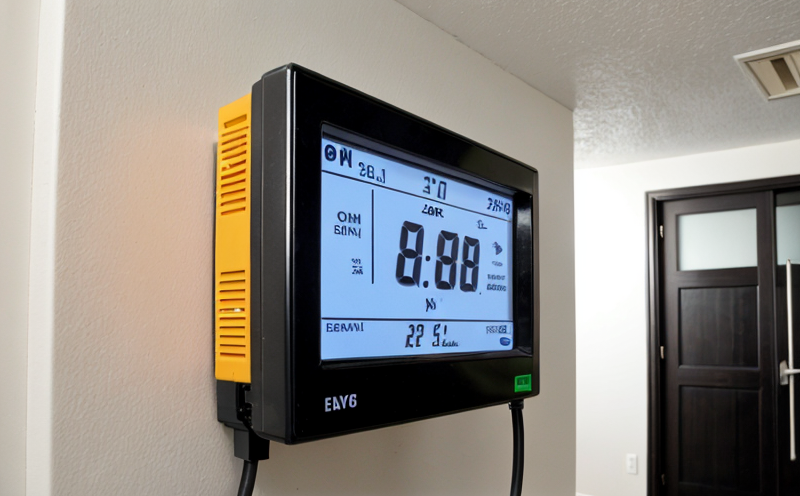ISO 7345 Thermal Insulation Vocabulary Testing
The ISO 7345 standard is pivotal in the field of thermal insulation testing. This international standard provides a comprehensive vocabulary for discussing and specifying thermal insulating materials, systems, and components. Understanding the terminology used within this standard ensures accurate communication between stakeholders involved in the design, manufacturing, installation, and maintenance of thermal insulation systems.
Thermal insulation is crucial in various sectors such as construction, HVAC (Heating, Ventilation, and Air Conditioning), and industrial processes. It plays a significant role in reducing energy consumption by minimizing heat transfer through walls, roofs, floors, ducts, and pipes. The vocabulary provided in ISO 7345 helps to standardize the language used when specifying, manufacturing, installing, and maintaining these systems.
The testing process involves several key steps. First, the insulation material or system is prepared according to specified dimensions and conditions outlined in the standard. Then, it undergoes rigorous examination using appropriate instruments such as thermometers, calorimeters, and other specialized equipment designed for thermal analysis. The results of this examination are used to determine whether the product meets the required specifications.
The vocabulary defined by ISO 7345 includes terms related to thermal insulating materials (such as density, thickness, and composition), systems (like roof insulation or floor insulation), and components (insulation boards, batts, and rolls). This standardized terminology ensures that all parties involved in the project—from designers to installers—are on the same page regarding technical specifications.
For example, when specifying roof insulation, it is essential to know not only what type of material should be used but also its exact thickness and how it will interact with other building elements. The vocabulary provided by ISO 7345 helps clarify these details, ensuring that the chosen insulation system performs optimally in terms of energy efficiency.
Another important aspect of this testing is the use of appropriate units for measuring various properties of thermal insulating materials and systems. For instance, heat conductivity (λ) is typically measured in W/mK or Btu/(h·ft²·°F), while thermal resistance (R-value) may be expressed as m²·K/W or ft²·°F/Btu/h. By using consistent units throughout the project, misunderstandings can be avoided, leading to more reliable outcomes.
The testing process also involves assessing the durability and longevity of the insulation materials and systems over time. This includes evaluating factors such as degradation due to environmental conditions like moisture exposure or temperature fluctuations. Understanding these aspects is crucial for predicting long-term performance and ensuring that the chosen insulation will continue to provide effective thermal protection even under challenging circumstances.
Furthermore, the testing process may involve comparing different types of insulation materials based on their thermal properties. For example, some materials might offer better insulating qualities at lower costs, while others could be more expensive but more durable over time. By conducting thorough testing and analysis according to ISO 7345 standards, decision-makers can make informed choices that balance cost-effectiveness with long-term benefits.
It is worth noting that the vocabulary provided by ISO 7345 not only aids in specifying thermal insulating materials but also supports quality assurance throughout the entire lifecycle of a project. From initial design stages to final installation and maintenance, having a clear understanding of relevant terms ensures consistent application across all phases.
For instance, during the design phase, architects can use precise terminology from ISO 7345 when selecting appropriate insulation materials or systems for their projects. During manufacturing, these definitions help manufacturers produce products that meet specified performance criteria. In construction, workers following these guidelines ensure proper installation techniques are employed. Finally, during maintenance and monitoring, professionals rely on this standardized language to assess the condition of existing installations accurately.
Another key benefit of adhering to ISO 7345 standards lies in its role as a benchmark for quality control. By ensuring all parties involved use consistent terminology throughout each stage of a project, discrepancies or miscommunications are minimized. This leads to higher levels of confidence and trust among collaborators, ultimately resulting in better overall outcomes.
Moreover, compliance with ISO 7345 standards is increasingly becoming mandatory due to growing environmental concerns and regulations aimed at promoting sustainable practices within the construction industry. Many governments worldwide have implemented policies requiring adherence to such international standards for new buildings or major renovations. Therefore, familiarity with these standards can provide significant competitive advantages in today's market.
Industry Applications
- Construction: Ensuring proper insulation of walls, roofs, and floors.
- HVAC Systems: Enhancing efficiency by reducing heat loss or gain through ducts and pipes.
- Industrial Processes: Minimizing energy losses in large-scale manufacturing facilities.
- Solar Energy: Improving the performance of solar panels by maintaining optimal temperatures.
Why Choose This Test
Choosing ISO 7345 thermal insulation vocabulary testing offers numerous advantages for quality managers, compliance officers, R&D engineers, and procurement professionals alike. One significant benefit is the ability to ensure consistent communication between all parties involved in a project, leading to fewer errors and misunderstandings.
Another advantage of this test is its role in promoting best practices across various industries. By adhering to these standards, organizations demonstrate their commitment to quality assurance and environmental responsibility, which can enhance their reputation among customers and stakeholders.
The vocabulary provided by ISO 7345 also supports innovation within the industry. New materials and systems can be specified accurately using this standardized terminology, allowing for continuous improvement in thermal insulation technology.
Furthermore, compliance with these standards is often required by regulatory bodies or certification programs, making it easier to meet legal requirements and gain recognition from authorities responsible for enforcing building codes and energy efficiency regulations.
International Acceptance and Recognition
ISO 7345 has gained widespread acceptance globally due to its comprehensive approach to defining the vocabulary used in thermal insulation testing. This international standard is widely recognized by regulatory bodies, certification programs, and industry associations around the world.
The United States, Europe, Asia-Pacific region, Canada, and other countries have incorporated ISO 7345 into their national standards or regulations for specifying thermal insulating materials, systems, and components. Its broad acceptance reflects its relevance and importance in promoting best practices within the sector.





